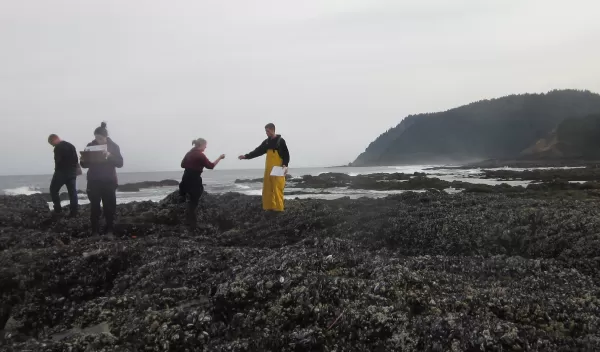
Coastal ecosystem being destabilized by climate change
Ecological communities on the Oregon coast are being subtly destabilized by the pressures of climate change despite giving an appearance of stress resistance, new research by Oregon State University scientists shows.
The findings are important because assessing and understanding how plants, animals and other life forms respond to a warming planet is critical to human welfare, lead author Bruce Menge said.
The study, supported in part by the U.S. National Science Foundation and published in Proceedings of the National Academy of Sciences, shows that ecological communities in Oregon's rocky intertidal zone have grown less stable for at least a decade, though their structure -- the organisms that comprise them -- has basically stayed the same.
"Through data collection on natural communities over long periods of time, this research has demonstrated that these rocky intertidal areas have a lowered capacity to bounce back from disturbances, which will have major implications for management of natural areas under climate change," said Betsy Von Holle, a program director in NSF's Division of Environmental Biology.
The community destabilization arises from decreasing resilience -- the ability to bounce back from disturbance. The findings suggest other ecological communities around the globe that project a look of stability wouldn't appear that way upon close inspection of how their member organisms collectively react in the face of disruption.
"Climate change is threatening to destabilize ecological communities," said Menge, who has been conducting research on the coast for four decades. "A possibility is that they'll stop being persistently occupied."
The research doesn't necessarily indicate that the iconic rocky regions of Oregon's shoreline are nearing an ecological tipping point where sudden, often irreversible ecosystem changes happen, the scientists said. But the findings aren't good news, either.
"On land, extreme wildfires illustrate how gradual changes in temperature or rainfall can eventually lead to catastrophic events," Menge said. "In the ocean environment, novel occurrences like marine heatwaves and disease epidemics are the new and acute threats being added to the gradual increases in water temperature and ocean acidification commonly associated with climate change."
The scientists said that although it’s difficult to predict exactly when a sudden ecosystem change will happen, systems nearing the brink may send out warning signals. Increasing variability of community structure is believed to be one sign, and another is a system recovering more and more slowly from small perturbations.
